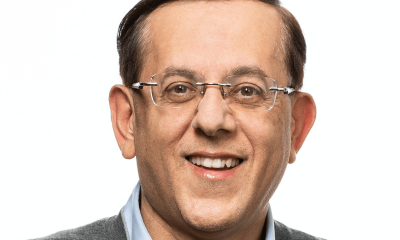Finance
Health startup Ada Health offers alternative to Googling your symptoms


The Ada Health team. From left to right: pediatrician
Claire Novorol, Daniel Nathrath, and neuroscientist Martin
Hirsch.
Ada
Health
-
Started by a pediatrician,
Ada Health is a tool that lets you type in your symptoms
and learn what’s ailing you. -
You can also track your symptoms over time and share
them with a healthcare provider. -
The
company is backed by Google’s chief business officer and
the entrepreneur behind Amazon’s Alexa.
To Google or not to Google — that’s often the question when it
comes to a troubling ailment like a cough or stomach pain.
But researching your symptoms online can send you down a rabbit
hole that leads you to think you have a life-threatening
condition. The alternative is a trip to the doctor, which can be
time-consuming and expensive. Given the
shortage of healthcare providers in the US, doctor’s visits
can often feel hurried and unpleasant as well.
Daniel Nathrath, the CEO of Berlin-based startup Ada Health, and his co-founder and chief
medical officer, Claire Novorol, have created a tool that they
hope will address this problem.
The Ada Health app is designed to give better information than
you’d get from Google results. Users open the free app, enter
their age and gender, and type in a symptom like pain or a cough.
Then a bot powered by machine learning asks several basic
questions, such as how long the symptom has persisted, what makes
it worse, and whether or not any related symptoms have popped up.
After a brief chat with the Ada bot, you’re brought to a screen
that displays what’s probably causing your issues. The results
are based on a large and growing database of hundreds of
thousands of people that match your age and gender.
Nathrath and Novorol hope the tool can nip some health fears in
the bud. It could also help people avoid unnecessary
doctor’s visits. There’s no waiting room, no appointment, and no
copay.
“This is what seeing your doctor should be like,” Nathrath told
Business Insider.
Ada compares you against others in your demographic
 Shutterstock
Shutterstock
Say you’re a 31-year-old woman experiencing stomach pain, for
example. Once you type in your symptoms and answer Ada’s
questions, it might tell you that, based on the other 31-year-old
women in the database, the vast majority who reported your
symptoms were diagnosed with Irritable Bowel Syndrome. Then
Ada may advise visiting a healthcare provider. Or if the likely
cause of your symptoms is not a serious issue, the service may
suggest that you rest and keep an eye on your symptoms.
“It’s like a conversation with a physician,” Nathrath said.
Ada reminds you throughout this process that it cannot diagnose
or treat an illness. All it does is give you the statistical
likelihood that you have a certain condition, based on the
information in the database.
Still, Ada’s results are more accurate than those of sites like
WebMD, which merely tell you the most likely cause of a condition
based on data from the entire population.
 Ada
Ada
Health
Ada is currently the highest ranked medical app in more than 130
countries. Roughly 45,000 cases are entered into the app’s
algorithm every day, and so far, roughly 6 million patients have
interacted with Ada.
Nathrath believes Ada could eventually reduce healthcare spending
by helping patients avoid unnecessary doctor’s visits and saving
their healthcare providers time. That’s a possibility that needs
to be tested with research, but investors seem to see the
platform’s potential.
Ada Health received funding from William Tunstall-Pedoe, the AI
entrepreneur behind Amazon’s Alexa, as well as Google’s chief
business officer Philipp Schindler. The company has raised $69.3
million since it was founded in 2011. At that time, it was aimed
at helping doctors track patients’ symptoms, but in 2016, the
company
pivoted to focus on patients and
launched as an app in Europe. They expanded to the US last
year.
“Essentially, what we’ve done is developed a medical AI that you
may have an easier time talking to than to your family doctor,”
Nathrath said.
Symptom checkers: The next popular primary care tool
Ada Health is not the only tool that lets users input and track
their symptoms. Another so-called “symptom checker” is primary-care app K Health, which
launched in New York in 2016 with funding from Box Group and
Comcast Ventures.
If these services can get the science and AI right, they offer a
big list of potential benefits, including reducing healthcare
costs, saving time for patients and doctors, and slashing
unnecessary worry. But it’s too early to say how beneficial these
tools really are for doctors or patients, since the data we have
on symptom checkers is quickly becoming outdated.
For a study published in the
journal BMJ in 2015, researchers from Harvard Medical School
reviewed 23 symptom checkers to see if they provided the correct
assessment of users’ symptoms and accurate recommendations.
(Neither Ada nor K Health were included since neither existed at
the time.) The researchers found that the checkers were correct
just over a third of the time; and their advice was determined to
be the proper advice for a given condition roughly two thirds of
the time.
Importantly, however, the study did not compare those findings to
statistics on human physicians.
Until better data becomes available on the utility of apps like
Ada Health and K Health, they can at least offer an educated
assessment about what’s causing a symptom like a sore
throat. Ada Health recently launched its service in two
additional languages — Portuguese and Spanish — to make it
accessible to even more users.
“Our biggest issue right now is serving the demand we have,”
Nathrath said.
-

 Entertainment6 days ago
Entertainment6 days agoWhat’s on the far side of the moon? Not darkness.
-

 Business7 days ago
Business7 days agoHow Rubrik’s IPO paid off big for Greylock VC Asheem Chandna
-

 Business6 days ago
Business6 days agoTikTok faces a ban in the US, Tesla profits drop and healthcare data leaks
-

 Business5 days ago
Business5 days agoLondon’s first defense tech hackathon brings Ukraine war closer to the city’s startups
-

 Business7 days ago
Business7 days agoPhoto-sharing community EyeEm will license users’ photos to train AI if they don’t delete them
-

 Entertainment6 days ago
Entertainment6 days agoHow to watch ‘The Idea of You’: Release date, streaming deals
-

 Entertainment5 days ago
Entertainment5 days agoMark Zuckerberg has found a new sense of style. Why?
-

 Business5 days ago
Business5 days agoHumanoid robots are learning to fall well






















